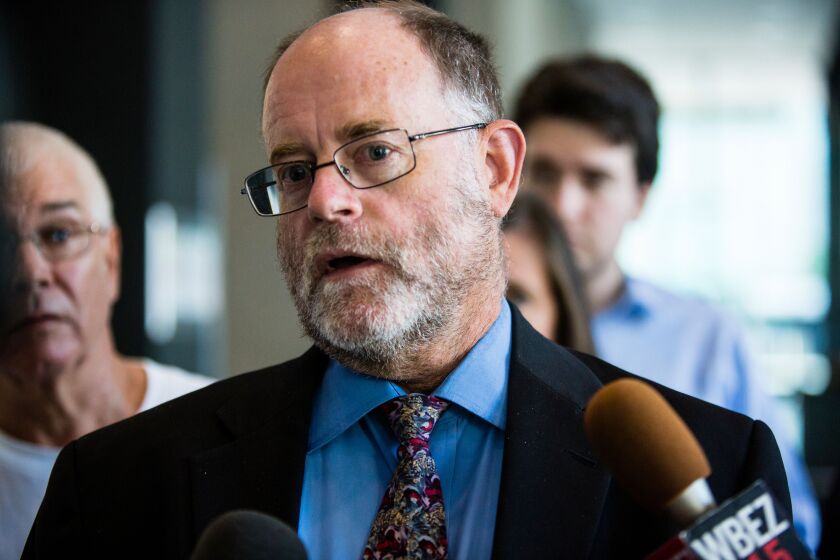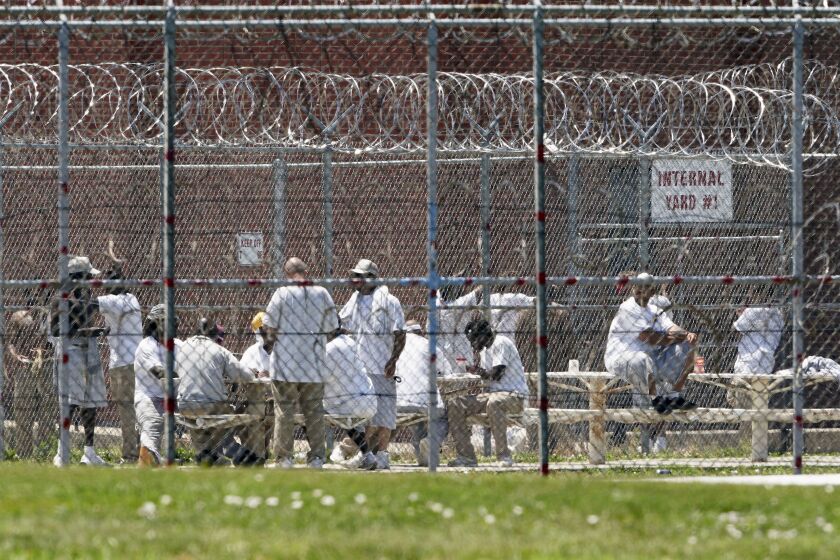At a Georgia state House of Representatives hearing on prison conditions in September, a corrections officer called in by phone to testify, interrupting his shift to tell lawmakers that his working conditions had become dire.
On a “good day,” he told lawmakers, he had six or seven officers to supervise about 1,200 prisoners. He said he’d recently been assigned to look after 400 inmates by himself. And there weren’t enough nurses to provide medical care.
“All the officers … absolutely despise working there,” said the officer, who didn’t give his name, saying he feared possible retaliation.
In Texas, Lance Lowry quit after 20 years as a corrections officer to become a long-haul trucker. He couldn’t bear the job any longer. Watching friends and coworkers die from COVID-19, along with dwindling support from his bosses, wore on him.
“I would have liked to stay till I was 50,” said Lowry, 48, “but the pandemic changed that.”
Staff shortages have been a problem for prisons for years because of the low pay and grueling work.
But the coronavirus pandemic has pushed many corrections systems into crisis. Officers are retiring and quitting in droves, and prison officials are struggling as they try to recruit replacements. And now some prisons whose populations dropped earlier in the pandemic have seen their numbers rise again, making things worse.
There’s no one reason pushing prison employees out in such high numbers, experts say. Some are leaving for new jobs as more employers are hiring. Many fear the higher risk of COVID in prisons.
“When jobs become riskier, it becomes harder to attract workers,” University of Michigan economist Betsey Stevenson said. “By failing to protect prisoners from COVID, the criminal justice system not only created an unfair risk of severe illness and death for the incarcerated, but the increased COVID risk to employees has undoubtedly contributed to staffing shortages.”
Unions representing prison officers say vaccine mandates will drive out unvaccinated employees and make staffing problems eve worse.
“There are dozens of reasons to leave and very few to stay,” said Brian Dawe, national director of One Voice United, an advocacy group supporting corrections officers. “Understaffing, poor pay, poor benefits, horrendous working conditions. … Officers and their families in many jurisdictions have had enough.”
Employers across a broad swath of industries are having difficulty hiring and keeping people during the pandemic. Nearly 3% of American workers, 4.3 million, quit their jobs in August, according to the most recent data from the U.S. Bureau of Labor Statistics.
The stakes are higher in prisons, where having fewer guards means more dangerous conditions for incarcerated people. And some of the officers left behind say worsening shortages have made an already difficult job unbearable.
In recent weeks, reporters from The Marshall Project and The Associated Press have spoken with workers, officials, lawyers and people incarcerated in more than a dozen prison systems to understand the consequences of the staffing shortfalls.
The federal Bureau of Prisons says about 93% of its front-line guard positions are filled, with little more than 1,000 vacancies, though workers in many prisons say they’re feeling the pinch as others are pulled in to fill in for missing officers.
Asked at a U.S. Senate hearing about federal prison staffing, Attorney General Merrick Garland said, “I agree this is a serious problem at the Bureau of Prisons.”
Mental health care for prisoners is taking a hit, too, prisoners and lawyers say, as people in prison grow more desperate.
In Illinois, canceled one-on-one therapy means that what little counseling is available happens only briefly and through a cell door in full earshot of the rest of the tier, said attorney Alan Mills, executive director of the Uptown People’s Law Center, which has sued the Illinois Department of Corrections over what it describes as inadequate mental and physical health care, due largely to a lack of qualified staff.
Lindsey Hess, a spokeswoman for the state corrections department, said the Pontiac Correctional Center continues to provide out-of-cell programming and one-on-one counseling.
“While staffing challenges have had an impact on scheduling, the department is committed to delivering the highest quality mental and medical health care as possible,” Hess said.
In Kansas, state Department of Corrections Secretary Jeff Zmuda testified before the legislature that the problems now are unlike any he’s seen. Kansas has more than 400 unfilled jobs for uniformed officers, a number Zmuda said he expects will rise as workers are lured away by better-paying employers.
Quitting can have a snowball effect, said Doug Koebernick, inspector general of the Nebraska correctional system.
“People leave, then that creates more overtime and stress and more vacancies,” Koebernick said. “It’s like this spiral.”
Many corrections officers interviewed said they were forced to work more overtime as fewer people showed up for shifts. In Texas, guards have worked as much as 16-hour days.
Inside prisons, growing shortages mean a rise in lockdowns. Restrictions that might have begun as a way to stop the spread of COVID have continued because there aren’t enough guards to supervise activities. Some in prison say they can’t take classes, participate in group therapy or even work out in the recreation yard or take a shower. That can force those in general population into de facto solitary confinement, prisoners said, and those already in segregation into near-total lockdown.
“If we get rec once a week, that’s a good week,” said Anthony Haynes, who is on Texas’ death row in a unit that is barely half-staffed. “We don’t always get showers.”
A spokesman for the Texas Department of Criminal Justice did not respond to Haynes’ claims but acknowledged staffing problems in Texas’ prisons.
“Before COVID-19, staffing was frequently impacted by economic surges and competing employment opportunities,” spokesman Robert Hurst said. “The pandemic has exacerbated these issues.”
Hurst said Texas has closed six of its more than 100 facilities in the past year due to staffing problems.
Kansas has cut job training and reduced supervision for people after they’re released. Two-thirds of the men in Nebraska’s prisons can’t see visitors on weekends — when most families are free to travel — because of understaffing.
The isolation takes a toll.
“As of October, we have not had yard for two weeks,” wrote one man at Pontiac Correctional Center, where officials report 35% of corrections jobs are vacant.
In testimony compiled by lawyers suing the Illinois prison system over a dearth of mental health care, he wrote: “I feel very overwhelmed … I can’t talk about my problems to anyone. I pace back and forth and talk to myself because there’s nothing else to do.”
Dr. Homer Venters, former chief medical officer for the jail system in New York City, inspects conditions in prisons around the country for court cases. Understaffing will lead to an increase in preventable prison deaths, Venters said, as the quality of care worsens.
“Things are much worse behind bars now than they have been for a long time,” Venters said. “There are so many staff that have left. That means that basic clinical services, like getting to scheduled appointments, just isn’t happening the way it was even five years ago.”
Violence is also on the rise in some prisons. The Southern Center for Human Rights recently sued the Georgia Department of Corrections, citing lockdowns and dangerous conditions: There were 48 suspected homicides in Georgia’s prisons between January 2020 and August 2021 and 38 suicides. In 2017, there were eight homicides. Hundreds of people incarcerated at three state prisons rioted last summer after being locked in their cells for weeks and monitored by as few as six guards at a time.
In July, Georgia had a 56% annual turnover rate for corrections officers, and 40% of those jobs were vacant, according to department documents. In September, the Justice Department announced an investigation into the corrections department, citing understaffing as a primary concern.
Corrections departments say that, to recruit new staff, they’ve taken steps like boosting social media posts and in-person job fairs. In Indiana, they raised starting pay for corrections officers a dollar to to $19 an hour. Other states are giving perks like hiring bonuses, better pay to work in critical units, earlier pay raises and, in Kansas, extra time off for current employees who refer new hires.
But some hurriedly hired cadets might not last long. Brandon Robert Graham started training at the Walla Walla State Penitentiary in Washington in August 2020 and within two weeks was on the tier.
“They were in such a hiring crisis that I was a ‘rapid hire,’” Graham said.
He’d been excited about the salary and “great benefits” compared with other jobs. But, as more entry-level jobs became available elsewhere, he started looking.
“I was on night shift,” Graham said. “I never got to see my fiancée. I did so much overtime that I thought I was getting sick from the stress.”
In July, he quit to look for a new job.
Contributing: Tom Meagher | The Marshall Project, Michael Balsamo | AP








